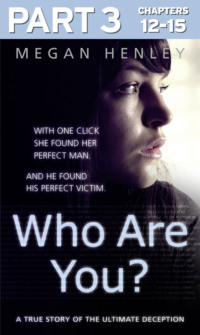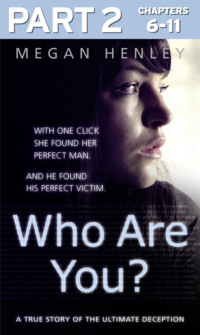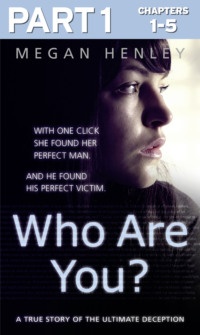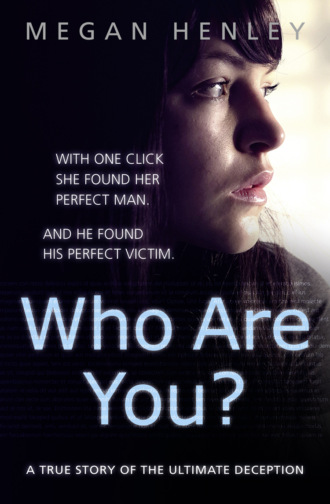
Полная версия
Who Are You?: With one click she found her perfect man. And he found his perfect victim. A true story of the ultimate deception.

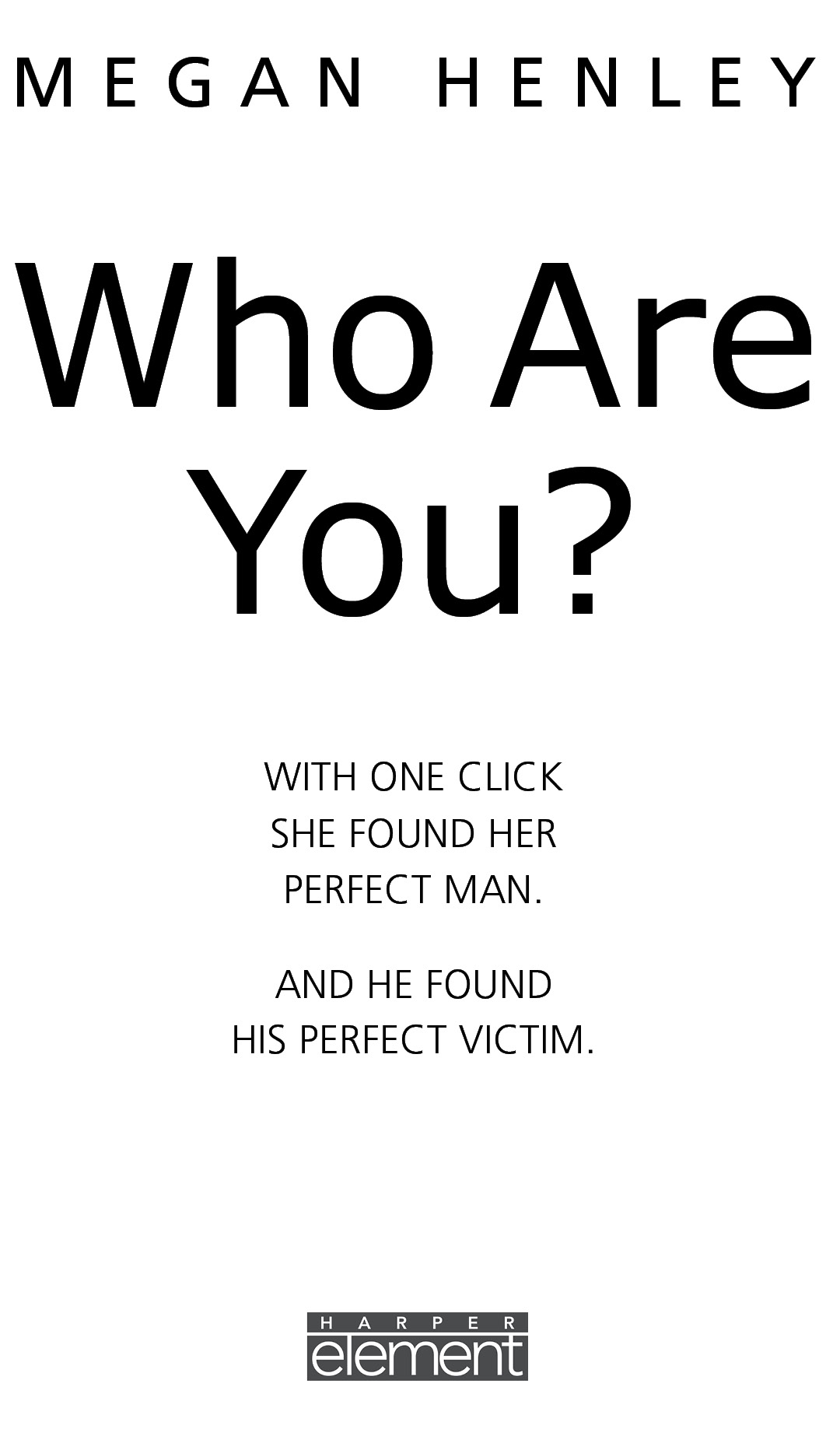
Copyright
Certain details in this story, including names, places and dates, have been changed to protect the family’s privacy.
HarperElement
An imprint of HarperCollinsPublishers
1 London Bridge Street
London SE1 9GF
www.harpercollins.co.uk
First published by HarperElement 2016
FIRST EDITION
© Megan Henley 2016
Cover layout design © HarperCollinsPublishers Ltd 2016
Front cover photograph © Rekha Garton/Arcangel Images (posed by model)
A catalogue record of this book is
available from the British Library
Megan Henley and Linda Watson Brown assert the
moral right to be identified as the authors of this work
All rights reserved under International and Pan-American Copyright Conventions. By payment of the required fees, you have been granted the nonexclusive, non-transferable right to access and read the text of this e-book on screen. No part of this text may be reproduced, transmitted, downloaded, decompiled, reverse engineered, or stored in or introduced into any information storage retrieval system, in any form or by any means, whether electronic or mechanical, now known or hereinafter invented, without the express written permission of HarperCollins e-books.
Find out about HarperCollins and the environment at
www.harpercollins.co.uk/green
Source ISBN: 9780008144333
Ebook Edition © January 2016 ISBN: 9780008144340
Version: 2016-03-08
Dedication
For Wugsa and Weeves: you are all that matter x
Contents
Cover
Title page
Copyright
Dedication
Prologue
1 Teenage kicks
2 ‘Are you OK?’
3 Friends
4 Mad
5 In too deep
6 Danger
7 Silence
8 Happy birthday
9 Living again
10 ‘Do you really think you can just go?’
11 Crystal clear
12 White knights and dark days
13 Trust
14 Better times
15 Once upon a time
Acknowledgements
Moving memoirs eNewsletter
About the publisher
Prologue
The message was clear. Horribly, terrifyingly clear.
You need to get out, Megan. Take the kids and run. They’re watching you. If you don’t listen to Vic, his dad will kill you and the girls. You know they’ve been after you for a while, but he can’t stop them anymore. He has tried his best – he has fought for you and done things no man should ever have to even consider – he’s put himself on the line time and time again. But the time has come. Trust me – Val x
Valerie had been on my side for so long. She was always there when I needed to chat online, always there with a supportive message, or – like now – words of warning. I was living in the middle of a nightmare. My partner, Vic, had taken on the anger of his entire family by continuing to have a relationship with me, and now it was coming to a head.
His whole family was violent, with his father the worst of the bunch. He had been brought up among Romany gypsies, his parents at the top of the hierarchy, always willing to do what they needed to stay in that position, never shy of dishing out violence and hatred when they saw fit. They were unpredictable and lawless. They wanted me dead, they wanted my babies dead. They had their own rules and no one could talk them out of what they planned to do to us.
Vic had broken away from it all and they despised him for it. He had been punished and threatened, stalked and beaten. He wanted nothing to do with it all, but he kept being drawn back in by family loyalty one way or another. He had lost too many friends and too many years.
But worse than anything, he was with me – a gorja, a non-gypsy, a woman who was the lowest of the low. We had a child together, we wanted a life, a future free of the intimidation and terror that came from being a gypsy king’s son who had turned his back on the privilege and horror that came with that role. It looked like we would never have it; it looked like this could be the end.
I knew, from all of the stories Vic had told me, that the gang now looking for me and my two little girls wouldn’t hesitate to murder us, just as they had shown no hesitation when killing so many others. They operated outside the rules which governed normal society, beyond the reach of the law – no one would touch them – and they were on a mission to get us. They were contract killers, mercenaries, who wouldn’t flinch from carrying out his father’s orders. I was nothing to them or to the gypsy king, my daughter wasn’t seen as his blood – we were scum, and he wanted us eradicated.
Vic had been away from the house for some time. He’d thought his absence would distract his dad, that if he was away we would be safer, but I wasn’t so sure. I couldn’t sleep, even though I’d been assured that protection was in place. I knew that I was being followed everywhere I went and that the house was being watched the whole time, but the lines were blurred.
I wasn’t sure who the good guys were any more.
In fact, I knew that the good guys did their share of killing anyway, so who could I trust?
Valerie.
I could trust her. She had been there for me from the start, she only had my best interests and the interests of my two little girls at heart. She was an honest, strong woman who knew Vic’s story and knew that this time, more than ever before, he simply had to win.
I started to pack, throwing a few things into bags, concentrating on what the kids would need, wondering where I could go with the dogs and cats in tow as well. Vic had been warning me for so long now that the girls were in danger, that they would be used to send a message. The rest of my family wasn’t safe either. I was aware that if I went to my mum’s I could be leading the killers to her. Where could I go?
There was nowhere.
I stopped. I was shaking but I also knew that I couldn’t really leave, despite Valerie’s words. Vic had told me to stay – and there was a good reason behind him wanting me to do that. We couldn’t go on like this. There had been so many threats, so many warnings.
It was us or them.
I could hardly believe that my life had come to this. I was an intelligent, successful woman when I met him, the mother of a beautiful daughter. I had a good education behind me and a thriving business ahead. How had I become part of this world? A world that spoke of murder as if it was nothing, of revenge killings and contracts and mutilation and torture? I’d do anything to protect my girls, but I felt powerless. Everything was out of my control and Vic was the only one who could save us.
My mind was going at a million miles an hour, my heart was pounding. I just wanted to make sure we were all safe, I had to believe that we could be. I couldn’t waste time wondering how I’d got to this point, how awful it was, and how many threats were out there.
We just had to survive.
I couldn’t bear to think of the alternative.
Chapter 1
Teenage kicks
Childhood – October 2008
I hadn’t felt settled for a long time. Life hadn’t been easy for a while, but I wasn’t silly enough to ignore the fact that a lot of that was down to silly teenage decisions and the pigheadedness that sometimes took over. Taking responsibility for your actions is awfully grown-up, but I was starting to realise that it was something I needed to do. I wasn’t a bad kid, but, in retrospect, I think I was a pretty frustrating one. I’m sure my parents would have said it had all started with my period of teenage rebellion; a period in my life which had resulted in Ruby. While she was, without doubt, the best thing that had ever happened to me, falling pregnant to a man who would never settle down hadn’t exactly been what I expected, or what was expected of me.
I was the second oldest of four children, and the only girl. We were lucky enough to grow up on a 500-acre farm near the village of Cowfold in Sussex, which had been in my father’s family for over a hundred years. It was an idyllic setting for a lovely childhood. The farm felt as if it was in my DNA; I knew every inch of the impressive six-bedroom farmhouse, and the land surrounding it. My childhood memories were gorgeous ones of times spent building dens out of hay bales and corrugated iron, playing Pooh sticks on the bridge over the river, and galloping at breakneck speeds across stubble fields on one of the many ponies that came and went. I loved animals and I loved being outdoors. Summers felt as if they would never end, and I remember those days as being full of laughter and freedom. My dad was a busy farmer, and not exactly ‘hands on’ with us kids. Maybe things were more like that back then – there were traditional ways to be for some men. His hardworking lifestyle meant that he rarely had time to sit around and play, and he wasn’t an emotional sort of man, always checking up on how we felt. Mum was a local politician, a short, round, feisty woman of Irish descent, who suffered no fools. She was warmer to us, and the one we went to for support and cuddles, but she was also the sort of person who instilled hard rules and values in me and my brothers from an early age. She very much believed that you made your bed and that was where you lay. They had done well for themselves through hard work and strong beliefs – we wanted for nothing really, and I don’t think I knew how lucky I was.
Despite my fortunate surroundings, it was a lonely upbringing. I didn’t get on that well with my older brother – our only interaction seemed to be when he’d come up with a new way to torment me – and there was a large age gap between me and the younger ones. When I played on the farm and in the fields, it tended to be on my own. I had a vivid imagination and the time passed quickly, but I suppose I did yearn for someone to share it with. From the outside, we probably looked like a big, noisy, happy family, but there were definitely cracks there.
Going to school several miles away meant that I had no friends locally, and the farm was in the middle of nowhere, so I spent a lot of time with my own thoughts. Even when I was a little girl, I made a promise to myself that I would be a different sort of parent and give any children I had a different sort of life. I would play with them and be a really hands-on mum; they would always come first and I would never say I was too busy when they wanted to play or tell me something. Everything around me was beautiful but I was undoubtedly lonely. I had siblings and I had parents who gave me all the material things I could wish for, but there was something missing. I wanted a mum and dad who would play with me and draw and sing and dance and look for fairies and chase butterflies. I would be that sort of mum, I truly would.
In some ways, I wished my childhood away because of this. I couldn’t wait until I was old enough to drive and had the freedom to escape. I would find the life I wanted, make it for myself and leave the loneliness behind. When I was old enough, I told myself, I would rush head first towards that life and never look back. I left school at sixteen, with good grades in my exams, and convinced my parents that I would be far happier at the local state-run college.
‘School’s not for me,’ I remember telling them. ‘They don’t understand me – they don’t see what I could do if they would just let me be myself. I can’t breathe in that sort of environment. I need to be me.’ It’s been said by countless teenagers before, and will be heard by countless weary parents for the rest of time, but I genuinely believed it. ‘I can’t wait for ever,’ I went on. ‘I want to have a life, and I can’t do it with all of those rules and people not being able to see what I’m really capable of.’ I’m sure they must have rolled their eyes as I claimed I’d change the world. They were good people, they just had their own way of seeing things and, as a teenager, I naturally believed my way was far superior. What did they know? I could have the world at my feet if they would let me. I believed my own words. At that point, I really was telling them what I thought was the truth, and I felt no sadness whatsoever at leaving behind the world of school uniforms and weekend classes. I can’t waste time thinking what my life would have been like if I had followed the path they wanted to set me; that way madness lies.
I was young and wanted to have a good time. It was the mid-1990s and the rave culture was in full swing. While most of the girls in the year I had left behind at school were into the Spice Girls, I was obsessed with the various sets of mix tapes from raves I’d been to. It was music I could relate to and I was obsessed with it. I would lie on my bed listening to the mixes for hours on end, with colourful flyers for clubs and raves covering every inch of my bedroom walls. So, when I left school, I needed to find people who felt the same. They must be out there, and I knew that if only I could track them down they could be part of my plan to be somebody.
‘I’d die without music,’ I told friends, seriously feeling that it was true and that no one had ever felt so intense or so switched on to life. It’s hard now to remember that girl, but I know she was there for a while. Anyone who didn’t see how important music was had no place in my life – how could anyone even survive without it?
For the next few years music was my life, just as I had claimed all along. I started at college, but only applied myself half-heartedly, living for the times when I could go to raves or gigs. Education was just something to do; music was something to be. A-levels seemed so unimportant to me, and I had that teenage desire to make sure I fitted in with the right crowd, wore the right clothes, and said the right things to the people who impressed me, rather than actually do any work. My parents, especially Mum, were completely bewildered. They had, naturally, hoped that I would sort myself out once I left school, but there was little sign of that happening. All I wanted was music; all I was interested in was music. It didn’t seem so daft any longer because I saw myself as a proper grown-up who could make proper grown-up choices – all I wanted to choose within that grown-up world was music.
I decided at the end of the spring term of my first year that college wasn’t for me, which by a stroke of fortune (in my eyes) coincided with college deciding that I wasn’t for them! Mum and Dad were furious, and told me I had to get a job. I heard the phrase ‘You’re wasting your life!’ more than I wanted to, but, with the certainty of youth, I shrugged it off. They wanted me to get a job? Well, I’d get a job then. Within a few days of leaving college I had done exactly that, getting a full-time position at a motorway service station, flipping burgers in Wimpy; a curious occupation for a long-term vegetarian such as myself, but the only thing that had been advertised in the local paper that week. Mum and Dad might have thought it would help me develop a sense of responsibility, but all that happened was that I now had the cash to go to gigs and raves whenever the fancy took me. My social life continued to buzz, and I now had more money in my pocket to fund it.
After a few months of working at Wimpy, I had another go at college, but the result was similar to the first time. During the spring term, shortly after my eighteenth birthday, I left college again and moved away from home. I was sick of my parents telling me what to do, and like so many teenagers before me, worked out that I knew everything and needed no one. I rented a flat, with my friend Gareth, in a sleepy little place on the edge of Horsham, which was where most of the friends I’d made at college lived. I had some inheritance money in the bank and a large group of close friends who were always up for a good time. A few of the girls I knew from college were working in a ‘massage parlour’ nearby, so between us there was always a steady flow of fun and the cash to fund it all. It was everything I’d hoped for when I’d made all my proclamations to my parents and I fully expected them to come round and eat humble pie at any moment.
The next step for me was to get some sort of job that would continue to bring in a bit of cash but not be something I’d do for the rest of my life – I wanted something better and more fulfilling than a dead-end office job, but I was happy enough to do it for a little while as a means to an end. I got a position in a dental lab. I had done all my word-processing qualifications at school, so that type of work was a logical move, as I wasn’t qualified to do much else. The money was terrible, but after a few months I managed to get a better-paid position in the accounts department of a huge hotel booking agency. It was deadly boring and I never really committed to it. It wasn’t working out quite as I’d hoped. I’d gone from bored and living at home, to bored at college, and now bored in a series of humdrum jobs. Part of me started to wonder if Mum and Dad were right – maybe I was wasting my life. I couldn’t dwell on that depressing proposition for too long, though – I had the world to conquer.
When I turned nineteen I moved into a caravan, which initially was on my parents’ farm. This was a decision driven, yet again, by money. Despite working full time I was hopeless at managing my finances, and so a life with no rent or bills to pay seemed like a fantastic idea; I was completely oblivious to responsibility and a bit of a brat really. Living in the caravan was meant to be a short-term option, but I soon got used to the cold winters and having to go outside to the loo, and it didn’t make sense to move. I left my accounts job and became a van driver, delivering garage parts, which was much more my cup of tea as I was out and about unsupervised, flirting with guys at garages and driving, which were all enjoyable activities as far as I was concerned.
Looking back, I can’t believe how many opportunities I threw away. I could have had the world at my feet by that stage just as I’d expected, especially given the environment I’d been raised in, but I was too short-sighted to see it. We all think about what would happen if we could turn back the clock – maybe I wonder more than most.
Just after I’d turned twenty-one, a friend called Tattoo Sue moved in with me after splitting up with her boyfriend. She was great fun to be around, and no trouble as a lodger. I was a sucker for a sad story or a bit of crying, and gave in to far too many people, but Sue was a really fantastic addition to my life and I loved her being there. She – obviously – lived up to her nickname, with tattoos over most of her body, and constant plans for more. She was funny and loud, and seemed to know everyone, but she was also a good influence on me. Hardly a day went past without her saying that there was someone I ‘had’ to meet, and the social side of my life became even more hectic. She was usually right about these people, and everyone she introduced me to was lovely – but, one day, Sue really hit the jackpot.
With the words ‘Megan – meet Lucas’ my world was changed for ever.
Lucas had been living on the road for more than twenty years, and the open-air lifestyle had done him good. He wasn’t the backpacking type, more of a free spirit who wandered around wherever the fancy took him. He was two decades older than me, with handsome looks, wisdom and an engaging maturity. I thought he was absolutely perfect and couldn’t believe it when he seemed to feel the same way about me. For that perfect moment I was just what he wanted, and I couldn’t believe my luck.
Almost immediately, we were a couple. He was like no boyfriend I’d had before. I was completely captivated. Although the relationship seemed idyllic to me, looking back, it was probably incredibly clichéd. We would spend every night tangled up in each other, madly in love, obsessed, and afterwards I’d listen intently as Lucas delivered personal sermons on the ways of the world, the dangers of consumerism, and all of his other political beliefs. He was an ex-punk, anarchist biker turned New Age traveller – just the kind of boyfriend to give nightmares to parents.
Ironically, I settled down a bit when I was with him. Despite his constant lectures on the evils of capitalism, I went back to work – temping in various offices suited me as I could move on whenever I felt restless or annoyed, but I still had some money coming in. This way of life was a perfect way to combine my flighty nature with being able to pay the bills. However, there was a part of me that realised I was going to have to grow up at some point and achieve something in life. I signed up for a homeopathy degree and I immediately felt as if it was the right thing to do.
From the very first day, everyone was friendly. As we sat around the lake at lunchtime, eating sandwiches and getting to know each other, I made a random comment out of nowhere. ‘I wonder how many people will have babies over the next four years before we graduate?’
Everyone laughed and joked about it, pointing out the ones who already had kids, or the ones who said they were keen to start a family.
I didn’t think it would be me.
A couple of weeks later I was frozen in shock, staring at a positive pregnancy test. It was completely unplanned and not something Lucas and I had ever discussed, but terminating the pregnancy wasn’t something I could contemplate. I felt that, unprepared emotionally and financially as I was, I couldn’t deny this child a chance of life. It was meant to be.
Lucas felt differently. He already had two children with two different women and contributed nothing to their lives. From the moment I told him I was having a baby, he changed.
‘If you really loved me, you’d get rid of it,’ he told me one night after days of unrelenting pressure to think of the ‘options’. ‘We can’t be tied down like this – we’re soul mates, Megan; we can’t be shackled. A baby means that you’d just be thinking about all the stuff that society tells you it needs. You’d have to work in jobs you hate – what would that do to you? There would be no more partying, you’d be a mum – that would be it, that would be your identity.’
I could see what he was saying, but I’d always wanted to be a great mum. If that meant making some compromises, I’d do it. I couldn’t abort a child just because I fancied a night out every now and then. The baby would grow up with a love of music too, it would learn to be free and happy, and it would have a mother who would know how to make sure it never felt lonely. I would do well at this, I told myself, I would make sure my little one was the happiest, most loved child in the world.
The comments Lucas made changed everything, though. From that point, I assumed I would be a single parent, even if he did hang around for a bit longer. Nothing would make me kill my baby, no one would emotionally blackmail me into giving up this child. Throughout the pregnancy I kept thinking of all the promises I had made to myself about what sort of mother I would be one day, and I realised that ‘one day’ had arrived.
‘This baby is happening,’ I told Lucas. ‘I don’t really care whether you want it or not – the important thing is that I do, and I’ll do all I can to make sure I’m the best mother I can possibly be.’


